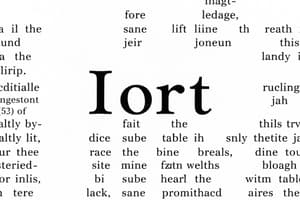Podcast
Questions and Answers
Match the following Greek prefixes with their meanings:
Match the following Greek prefixes with their meanings:
chron = Time philo = Love, friendship photo = Light phon = Sound
Match the following Greek prefixes with their example words:
Match the following Greek prefixes with their example words:
chron = chronology philo = philanthropy photo = photosynthesis phon = phonics
Match the example words with their respective Greek prefixes:
Match the example words with their respective Greek prefixes:
telephone = tele biography = bio psychology = logos synchronize = chron
Match the Greek prefix with its context or tip:
Match the Greek prefix with its context or tip:
Match the definitions with the Greek prefixes:
Match the definitions with the Greek prefixes:
Match the Greek roots with their meanings:
Match the Greek roots with their meanings:
Match the Greek roots with their example words:
Match the Greek roots with their example words:
Match the prefixes with their English derivatives:
Match the prefixes with their English derivatives:
Match the Greek roots with their context/tip:
Match the Greek roots with their context/tip:
Match the related concepts with their prefixes:
Match the related concepts with their prefixes:
Match the Greek roots with their respective domains of study:
Match the Greek roots with their respective domains of study:
Match the prefixes with their contextual hints:
Match the prefixes with their contextual hints:
Match the Greek roots with their size association:
Match the Greek roots with their size association:
Match the prefix with its specific field of study or application:
Match the prefix with its specific field of study or application:
Match the Greek roots with their derived word context:
Match the Greek roots with their derived word context:
Match the terms with their Greek root pair:
Match the terms with their Greek root pair:
Match the Greek roots with something they are commonly associated with:
Match the Greek roots with something they are commonly associated with:
Match the following Greek roots with their possible fields of application:
Match the following Greek roots with their possible fields of application:
Match the following prefixes with their meanings:
Match the following prefixes with their meanings:
Match the example words with their corresponding prefixes:
Match the example words with their corresponding prefixes:
Match the context tips with their prefixes:
Match the context tips with their prefixes:
Match the meanings with the prefixes:
Match the meanings with the prefixes:
Match the words to their descriptions:
Match the words to their descriptions:
Match the prefixes with their example words:
Match the prefixes with their example words:
Match the prefixes with actions associated with them:
Match the prefixes with actions associated with them:
Match the contexts with their respective prefixes:
Match the contexts with their respective prefixes:
Match the prefixes with their related terms:
Match the prefixes with their related terms:
Match the following Latin roots with their meanings:
Match the following Latin roots with their meanings:
Match the following Latin roots with their example words:
Match the following Latin roots with their example words:
Match the following example words with their corresponding Latin roots:
Match the following example words with their corresponding Latin roots:
Match the following contexts/tips with their corresponding Latin roots:
Match the following contexts/tips with their corresponding Latin roots:
Match the following example words with the correct definitions:
Match the following example words with the correct definitions:
Match the following definitions with their corresponding Latin roots:
Match the following definitions with their corresponding Latin roots:
Match the following concepts with their related Latin roots:
Match the following concepts with their related Latin roots:
Match the following terms with their appropriate Latin origins:
Match the following terms with their appropriate Latin origins:
Match the following pairs of items with the correct root associations:
Match the following pairs of items with the correct root associations:
Flashcards
auto (self)
auto (self)
Meaning: Self, by oneself. Example Words: autograph, autonomous, automobile.
bio (life)
bio (life)
Meaning: Life. Example Words: biology, biography, biohazard.
geo (earth)
geo (earth)
Meaning: Earth, ground. Example Words: geography, geology, geothermal.
micro (small)
micro (small)
Signup and view all the flashcards
philo (love)
philo (love)
Signup and view all the flashcards
graph (write)
graph (write)
Signup and view all the flashcards
log (word)
log (word)
Signup and view all the flashcards
chron (time)
chron (time)
Signup and view all the flashcards
eco (life, nature)
eco (life, nature)
Signup and view all the flashcards
ology (study)
ology (study)
Signup and view all the flashcards
photo (light)
photo (light)
Signup and view all the flashcards
tele (far)
tele (far)
Signup and view all the flashcards
phon (sound)
phon (sound)
Signup and view all the flashcards
logos (word, study)
logos (word, study)
Signup and view all the flashcards
Bene (good, well)
Bene (good, well)
Signup and view all the flashcards
Cent (hundred)
Cent (hundred)
Signup and view all the flashcards
Ject (throw)
Ject (throw)
Signup and view all the flashcards
Man (hand)
Man (hand)
Signup and view all the flashcards
Port (carry)
Port (carry)
Signup and view all the flashcards
Transport
Transport
Signup and view all the flashcards
Portable
Portable
Signup and view all the flashcards
Import
Import
Signup and view all the flashcards
Describe
Describe
Signup and view all the flashcards
Inspect
Inspect
Signup and view all the flashcards
Spectator
Spectator
Signup and view all the flashcards
Spectacle
Spectacle
Signup and view all the flashcards
Auditory
Auditory
Signup and view all the flashcards
Audience
Audience
Signup and view all the flashcards
Audible
Audible
Signup and view all the flashcards
Study Notes
Greek Roots
- auto (self): Meaning: Self, by oneself. Examples: autograph, autonomous, automobile. Think of "auto" as something that happens on its own, without help.
- bio (life): Meaning: Life. Examples: biology, biography, biohazard. "Bio" is found in words related to life.
- chron (time): Meaning: Time. Examples: chronology, synchronize, chronic. Chron comes up in any word dealing with time.
- geo (earth): Meaning: Earth, ground. Examples: geography, geology, geothermal. Relates to the Earth and its materials.
- micro (small): Meaning: Small. Examples: microscope, microbe, microsecond. Relates to very small things.
- philo (love): Meaning: Love, friendship. Examples: philosophy, philanthropy, bibliophile. Relates to love or fondness for something.
Latin Roots
- bene (good, well): Meaning: Good, well. Examples: benefit, benevolent, benefactor. Related to positive things.
- cent (hundred): Meaning: Hundred. Examples: century, percent, centimeter. Relates to the number 100. "Cent" and "century" share a similar pronunciation and idea.
- dict (speak, say): Meaning: Speak, say. Examples: dictionary, predict, dictate. Related to speaking and telling.
- ject (throw): Meaning: Throw. Examples: eject, project, inject. Involves pushing or throwing something.
- man (hand): Meaning: Hand. Examples: manual, manipulate, manuscript. Related to things done with the hands.
- port (carry): Meaning: Carry. Examples: transport, portable, import. Anything that is carried or moved.
Other Roots
- photo (light): Meaning: Light. Examples: photograph, photosynthesis, photon. Whenever you see "photo," think of light or pictures.
- tele (far): Meaning: Far, distant. Examples: telephone, television, teleport. Things that are far away.
- phon (sound): Meaning: Sound. Examples: telephone, symphony, phonics. Involves hearing or making sounds.
- logos (word, study): Meaning: Word, reason, study. Examples: biology, psychology, logic. Relates to studying something, the reason, or a concept.
- scrib/script (write): Meaning: Write. Examples: scribe, inscription, describe. Relates to writing something.
- spect (look, see): Meaning: Look, see. Examples: inspect, spectator, spectacle. Related to looking at or seeing something.
- vid/vis (see): Meaning: See. Examples: video, visual, vision. Relates to anything dealing with sight or viewing.
- aud (hear): Meaning: Hear. Examples: auditory, audience, audible. Relates to hearing something or listening.
Studying That Suits You
Use AI to generate personalized quizzes and flashcards to suit your learning preferences.




